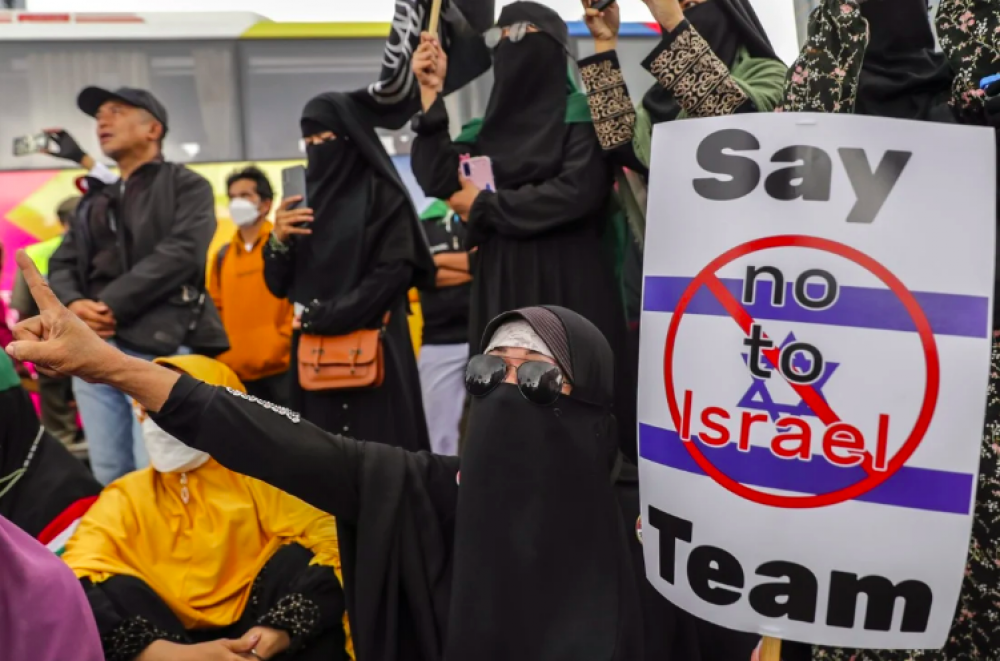In losing the right to host the Under-20 World Cup that was to take place this month, Indonesia is missing out on the chance to demonstrate diplomatic poise and show that sport is a crucial platform for promoting peace, writes Ogiandhafiz Juanda of Universitas Nasional Jakarta.
Protesting in Jakarta: The attitude of those against Israel’s participation in the football tournament was puzzling since in the past Indonesia has welcomed Israeli athletes at events without incident and with little if any controversy (Credit: EPA-EFE)
On March 29, the International Association Football Federation (FIFA) announced that it was removing Indonesia as host of the Under-20 (U-20) World Cup football competition that was scheduled to kick off on May 20. FIFA said that Argentina would step in as the replacement. Taking away Indonesia’s rights to hold the tournament not only thwarted the aspirations of young Indonesian football players to participate in the apex tier of global youth football but it also spurred mourning and discontent among a majority of sports enthusiasts across the nation.
FIFA’s revocation of Indonesia's hosting privileges was linked to the participation of Israel’s national football team in the event, which triggered consternation in Indonesian political circles. Parties and national and regional leaders, as well as some civic organizations, were dismayed by the prospect of the inclusion of the Israeli squad. Indonesian President Joko Widodo, known popularly as Jokowi, supported Israel’s joining, issuing a plea for people and parties to keep the realms of sport and politics separate.
The attitude of those who were against Israel’s appearance, including those concerned about safety and security, was puzzling since in the past Indonesia has welcomed Israeli athletes at events without incident and with little if any controversy. In 2015, for example, badminton player Misha Zilberman competed in the Badminton World Federation (BWF) World Championships in Jakarta. As recently as February 2023, Michael Yakovlev raced in the International Cycling Union (UCI) Track Nations Cup also in Jakarta. Outside the sports world, in March 2022 in Bali, a delegation from the Israeli Knesset attended the 144th General Assembly of the Inter-Parliamentary Union in Bali, despite Israel and Indonesia not having diplomatic relations.
FIFA’s decision was made after certain Indonesian officials called for the central government to bar Israel for participating in the U-20 World Cup. After Wayan Koster, the governor of Bali, which with Sumatra and Java was to host matches, sent a letter to the national minister of sports on March 14 to protest the appearance, some 100 people demonstrated in Jakarta to press the same message. “We, the Bali Province administration, reject Israel’s participation in Bali,” Koster wrote. “This event cannot be separated from humanitarian principles, as mandated by the Constitution and Bung Karno,” a reference to Sukarno, Indonesia’s first president. The governor noted that the Indonesian Constitution calls for the universal end of colonialism and that the country has supported statehood for the Palestinians since its independence in 1945. He suggested that, if Bali permitted the Israelis to play, Islamic terrorists could target the Hindu island known for cultural and religious tolerance.
Koster was not alone in citing the 1945 Constitution as grounds for banning the Israeli football squad. The pertinent passage is the initial paragraph of the preamble to the charter which affirms that “indeed, independence is the right of all nations and hence colonialism over the world must be abolished, given because it is not in accordance with humanity and justice”.
But for the politicians and others who protested, Indonesians were for the most part ready to adhere to the obligations required by FIFA of tournament hosts. Hosting the event would have been a major diplomatic opportunity to foster international understanding and harmony. Jakarta could even have used the tournament to promote the cause of Palestinian-Israeli peace. Consider the Euro 2024 football qualifier match in Geneva on March 29 between Switzerland and Israel in Geneva when many in the stands displayed Palestinian flags. Indonesians football fans would have been able to do the same at the U-20 World Cup. Now, that opportunity has been lost.
Those who opposed the participation of the Israeli football team argued that a devout adherent of Islam is obligated to advocate for the sovereignty of Palestine. But this religion and faith do not pertain to the Israeli-Palestinian dispute. Inhabitants of the state of Israel and of the occupied territories include Jews, Muslims and Christians. Casting the conflict as one between faiths is a false and polarizing narrative that could well cause division in Indonesia, the world’s most populous Muslim nation. Framing the controversy over the Israeli football team as a religious issue is unsuitable and contrived.
Further reading:
Check out here for more research and analysis from Asian perspectives.


